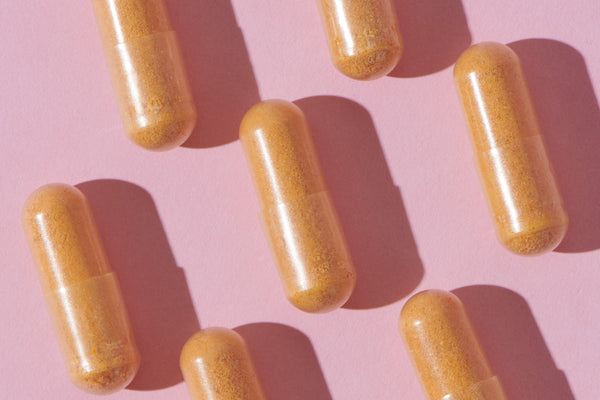Jump to:
Iron deficiency is one of the most common nutrient deficiencies worldwide — but when you get your blood results back, you might notice two terms that sound similar: iron and ferritin.
They’re connected, but not the same thing — and understanding the difference can help you make more informed choices about your health (and whether you might benefit from a supplement like IronBiotic).
Iron vs Ferritin: What They Each Mean
Iron is an essential mineral your body needs to make haemoglobin — the protein that helps red blood cells carry oxygen throughout your body. Without enough iron, your cells don’t get the oxygen they need, which can leave you feeling tired, weak, and foggy.
Ferritin, on the other hand, is a storage protein. Think of it as your body’s “iron bank account” — it holds extra iron in your tissues and releases it when needed.
So while iron measures what’s currently circulating in your blood, ferritin tells you how much is stored for future use.
Why Both Matter
When doctors assess your iron status, they often order a full iron study, which might include:
-
Serum iron (how much iron is circulating in your blood)
-
Ferritin (how much iron is stored)
-
Transferrin saturation and TIBC (how well iron is being transported)
Looking at all of these together gives a fuller picture of whether you’re truly deficient, borderline, or have enough stored to draw on.
What If My Iron Is Low but Ferritin Is Normal?
This is a really common question — and it can be confusing!
If your serum iron is low but your ferritin levels are within the normal range, it could mean one of a few things:
-
You’re in the early stages of deficiency.
Your body may still have enough stored iron (normal ferritin), but you’re starting to run low in your circulating supply. Over time, if it’s not corrected, your ferritin will begin to drop too. -
You have inflammation or infection.
Ferritin is what’s called an acute-phase reactant, meaning it can increase during times of stress, illness, or inflammation — even if your iron stores are actually low. In this case, your ferritin can appear “normal” or even high, masking an underlying deficiency. -
You’re not absorbing iron well.
Low serum iron with normal ferritin can sometimes point to absorption issues (for example, due to gut health, celiac disease, or certain medications).
The best next step? Review your whole iron panel with your GP or practitioner and consider factors like gut health, inflammation, and menstrual or dietary patterns before deciding whether to supplement.
Common Signs of Low Iron
Iron deficiency can show up in different ways, but some of the most common symptoms include:
-
Persistent fatigue or weakness
-
Feeling cold or sluggish
-
Pale skin
-
Dizziness or shortness of breath
-
Headaches or brain fog
-
Brittle nails, hair loss or thinning
-
Restless legs or heart palpitations
If any of these sound familiar, it’s worth checking your iron and ferritin levels with a simple blood test.
Who’s Most at Risk of Low Iron
Certain groups are more prone to low iron, including:
-
Women with heavy periods
-
Pregnant or postpartum women
-
Vegetarians and vegans
-
People with gut absorption issues
-
Athletes or those with high physical demands
How to Correct Low Iron (The Smart Way)
If blood tests confirm low iron, supplementation can help — but the type of iron you take matters. Some common forms (like iron sulfate) can cause constipation or stomach upset, leading many people to stop taking them altogether.
That’s why we created IronBiotic, a naturopath-formulated, vegan-friendly iron supplement designed to be gentle on your gut while improving absorption.
What makes IronBiotic different:
-
Uses Iron Bisglycinate — a well-tolerated, highly bioavailable form of iron
-
Includes probiotics to support a healthy microbiome and better absorption
-
Contains co-factors like Vitamin C, B vitamins, copper and beta-carotene to help your body actually use the iron
-
Free from constipation, nausea or heavy-metal aftertaste often linked to cheaper iron forms
It’s the practitioner-grade approach to restoring your energy, gently.
When to Re-Test
After starting an iron supplement, it’s important to re-test your iron studies (including ferritin) after around 8–12 weeks. This helps ensure your levels are improving and you’re not over-supplementing.
Once your levels are stable, you can usually maintain them through diet, or use a gentle ongoing dose to prevent drops — particularly during periods of high demand (like postpartum, heavy training, or low-iron diets).
The Bottom Line
Iron and ferritin are both key pieces of the same puzzle: one shows what’s available right now, and the other shows what’s in reserve.
If you’re feeling flat, foggy, or fatigued — it’s worth checking both before deciding to supplement.
And if you do need support, IronBiotic offers a gentle, effective option that combines bioavailable iron with probiotics and essential nutrients to help restore balance from the inside out.






